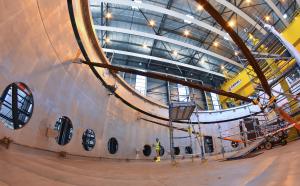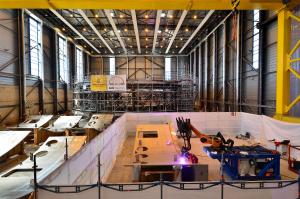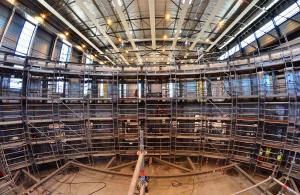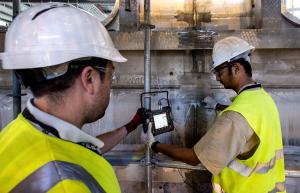Cryostat
Adjusting, welding, testing ...
23 Jul 2018
The assembly of the ITER cryostat—the stainless steel "thermos" that insulates the ultra-cold superconducting magnets from the environment—is progressing in an on-site workshop under the responsibility of the Indian Domestic Agency. Indian procurement scope includes the fabrication, assembly, welding and testing of four major sections (the base, lower cylinder, upper cylinder and top lid) as well as the installation and welding of the entire structure in the machine assembly "pit." Main contractor Larsen & Toubro Heavy Engineering has been tasked by the Indian Domestic Agency with the manufacturing design, fabrication and assembly of the cryostat.
The base section of the cryostat resembles a soup plate, with a deep bottom, vertical walls and a wide rim. In the picture above, the vertical walls have been trial fitted between the bottom plate (where the person is standing) and the top rim (which begins above the gap) for inspection.
Following inspection, the wall segments were disassembled. Adjustments are being made as seen above with a high-performance plasma torch. Once reassembled and welded into place, the full cryostat base will weigh 1,250 tonnes—the heaviest single component to be lowered by the overhead cranes into the machine assembly well in the Tokamak Building.
The lower cylinder of the cryostat—30 metres in diameter, 490 tonnes—has been completely assembled. During the welding operations of the last months, approximately 200 metres of circular and vertical welds were carried out. When all activities on this cryostat section conclude, it will be moved from the Cryostat Workshop to a protected location on the platform to make room for the upper cylinder segments that will be arriving from India.
It took approximately four weeks to verify half of the vacuum welds of the lower cylinder. Different specific ultrasonic examination probes are being used by Larsen & Toubro specialists to cover various angles and depth ranges.





